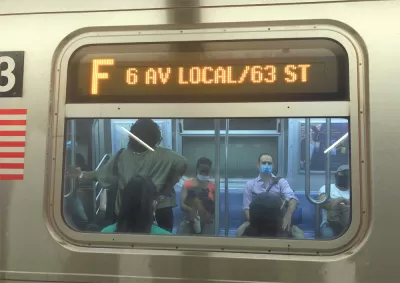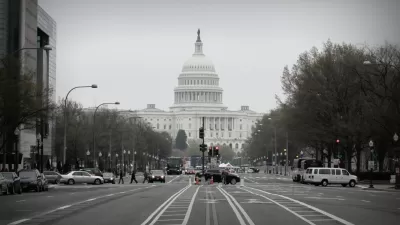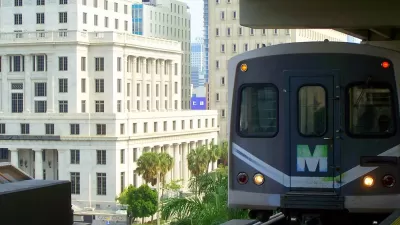A new economic stimulus package that appears headed for approval as of this writing will give $15 billion to public transit, far less than transit advocates had hoped, but far better than nothing.

Kea Wilson writes: "Congress is racing to pass a coronavirus relief bill that would throw transit agencies across the country a life raft — but as the saying goes, we’re going to need a bigger boat."
The COVID-19 Emergency Relief Act of 2020, as the new relief package is called, is a long time coming. The federal government approved its last stimulus package, the CARES Act, in March, and let another stimulus package called the HEROES Act, approved by the House of Representatives in May, languish in the Senate.
According to Wilson, the Emergency Relief Act of 2020 "would grant $15 billion to mass transportation agencies to be distributed on the basis of Federal Transit Administration formulas, restricting each urbanized area to a maximum of $4 billion. "No large city can receive more than 75 percent of its 2018 operating budget from the grants, and experts don’t expect there to be much left over after every small agency gets its initial cut," adds Wilson.
For transit agencies facing an existential crisis because of plummeting revenues of all kinds (sales and gas tax revenues are down in addition to fare receipts), the new funding will provide only a temporary relief, as mentioned by Wilson in the lede.
As noted by Wilson, advocates were hoping for funding on the order of $32 billion to help transit agencies weather the storm. Jeff Davis of the Eno Center for Transportation is quoted in the article saying that the funding should get "everyone" through March 31. A Tweet by Yonah Freemark also provides a breakdown of the expected allotments to specific transit agencies.
OK, revised estimates suggest that the new COVID Act should provide agencies:
- NY MTA ~$2.5-4b
- CTA ~$305m
- WMATA ~$530m
- NJT ~$305m
- MBTA ~$500-650m
- SEPTA ~$350m
(The 75% rule applies to *both* CARES & the new COVID Act--this will free up money for MTA, MBTA)— Yonah Freemark (@yfreemark) December 15, 2020
FULL STORY: New COVID-19 Relief Bill Starves Transit — Again

Alabama: Trump Terminates Settlements for Black Communities Harmed By Raw Sewage
Trump deemed the landmark civil rights agreement “illegal DEI and environmental justice policy.”

Planetizen Federal Action Tracker
A weekly monitor of how Trump’s orders and actions are impacting planners and planning in America.

The 120 Year Old Tiny Home Villages That Sheltered San Francisco’s Earthquake Refugees
More than a century ago, San Francisco mobilized to house thousands of residents displaced by the 1906 earthquake. Could their strategy offer a model for the present?

Housing Vouchers as a Key Piece of Houston’s Housing Strategy
The Houston Housing Authority supports 19,000 households through the housing voucher program.

Rural Population Grew Again in 2024
Americans continued to move to smaller towns and cities, resulting in a fourth straight year of growth in rural areas.

Safe Streets Grants: What to Know
This year’s round of Safe Streets for All grant criteria come with some changes.
Urban Design for Planners 1: Software Tools
This six-course series explores essential urban design concepts using open source software and equips planners with the tools they need to participate fully in the urban design process.
Planning for Universal Design
Learn the tools for implementing Universal Design in planning regulations.
Clanton & Associates, Inc.
Jessamine County Fiscal Court
Institute for Housing and Urban Development Studies (IHS)
City of Grandview
Harvard GSD Executive Education
Toledo-Lucas County Plan Commissions
Salt Lake City
NYU Wagner Graduate School of Public Service





























